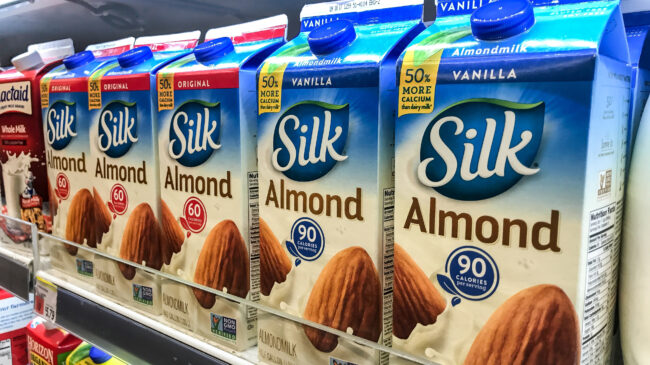The Food and Drug Administration is likely to move ahead with wrongheaded and unconstitutional plans to prohibit producers of non-dairy milks—including almond milk and soy milk—from using the term “milk” to describe their milks, Tom Philpott of Mother Jones reported earlier this summer.
The FDA’s plans amount to a course incorrection of sorts. And, once again, protectionist regulations pushed by many of the world’s biggest food producers—food standards of identity (SOIs)—are largely to blame.
Government-mandated SOIs establish specific rules under which a number of foods may be labeled using a given name. These standards were first introduced before World War II, I explain in my book Biting the Hands that Feed Us: How Fewer, Smarter Laws Would Make Our Food System More Sustainable, ostensibly to establish uniformity, boost consumer confidence, and prevent fraud in food production and sales.
Today, between the United States Department of Agriculture and FDA, hundreds of federal food standards of identity exist. For example, the USDA’s food standard of identity for hot dogs states that the tubular-shaped meat food must contain “raw skeletal muscle meat,” may (but need not) contain “poultry skin,” and may not contain more than 30 percent fat.
Though the goals of SOIs may seem laudable in theory, what they have done instead in practice is to obfuscate and confuse consumers and to offer them fewer choices while protecting large, powerful, incumbent industry players.
“Standards of identity often make the foods consumers buy subject to politicized meanings proffered by food industry lobbyists and regulators,” I explained last year. “That’s because they are typically established with the input of the biggest players in an industry to protect those members of that industry from smaller upstarts. Protectionism is a lousy basis for any law—but particularly one that rewrites the dictionary while restricting the First Amendment rights of food manufacturers.”
That’s exactly what’s happening here. Powerful dairy interests are pushing the FDA to limit their competition by forcing the government to redefine common words. That’s not just Orwellian and wrong, it violates the Constitution.
“The FDA knows it is unconstitutional to ban terms such as ‘coconut milk,’ ‘almond milk,’ and ‘oat milk,” wrote Justin Pearson, an attorney with the Institute for Justice, in an op-ed last month. “But because large and powerful groups have asked for the ban, the FDA is planning to impose it anyway.”
Pearson knows of what he speaks. In fact, he’s the first attorney ever to win a First Amendment lawsuit against a government entity over a food standard of identity. That victory in federal court involved an all-natural Florida creamery that refused to add synthetic vitamins to its skim milk, which violated the state’s SOI for skim milk. I worked with Pearson and served as the creamery’s expert witness in that case.
Pearson argues correctly the FDA “knows” its proposed actions are unconstitutional, pointing to the agency’s own words on the topic in the wake of the Florida skim-milk case. So why has the agency changed course?
“[P]owerful dairy groups like the National Milk Producers Federation have attempted to use their considerable clout… to compel the FDA ‘to bar foods such as almond milk, soy milk, and other plant-based drinks from using the term ‘milk’ to describe their non-dairy milk,” I wrote in a 2017 Reason.com column.
As I also teased at the time, should the FDA really decide to take a hard look at whom may use the term “milk” to describe their milk, the cow-milk lobby might not like what the agency finds. After all, why should regulations insist the unmodified term “milk” may only refer to cow’s milk?
Consider first the relevant dictionary definitions of “milk,” which include both “milk from an animal and especially a cow used as food by people” (which could refer to cow, goat, camel, or other animal-derived milks) and “a food product produced from seeds or fruit that resembles and is used similarly to cow’s milk” (which could refer to hemp, coconut, or other plant-based milks). Consider, too, that Americans drink many kinds of animal- and plant-based milks—from cow to goat to almond to coconut, hemp, rice, and soy—and so no one “milk” means “milk” to every consumer.
Given those facts, perhaps instead of prohibiting plant-based milk producers from using an accurate modifier alongside the word “milk” (e.g., ‘almond milk’) to describe their milks honestly, I’ve posited, couldn’t the FDA instead require cow-milk producers to modify their use of the term “milk” with the word “cow,” making that use consistent with every other use of the term (i.e., “goat milk,” “camel milk,” and “soy milk”)?
In 2018, a powerful dairy lobby, the National Milk Producers Federation, told the FDA it would soon “call[] for prompt enforcement actions against misbranded plant-based dairy imitators, as well as for the FDA to amend its regulations to codify its longstanding and well-tailored food labeling policies.”
Despite knowing such actions would be unconstitutional and amount to nothing more than shamelessly protecting powerful dairy interests at the expense of competitors and consumers, the FDA appears it will attempt to do—and no doubt be sued for—just that.

